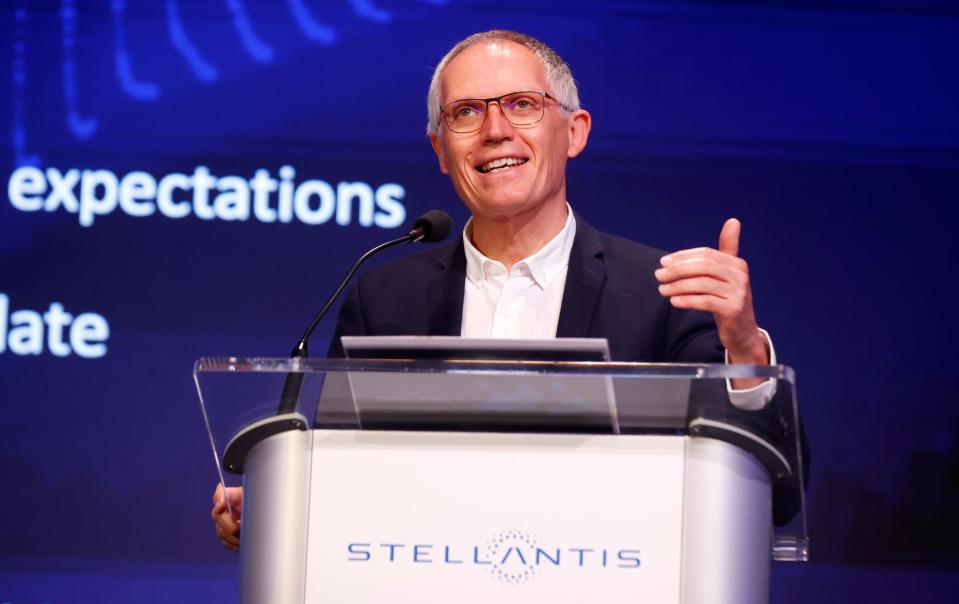Stellantis’ struggles this year are causing divisions between the company and its dealers, and this week, the rift was on full display.
The automaker’s U.S. dealers went public with their concerns about the company’s direction in the face of down sales and market share, prompting a stern response from a company that would prefer to keep the dispute behind closed doors.
The Stellantis National Dealer Council, in an open letter this week to CEO Carlos Tavares, said the council has been sounding the alarm to the company’s U.S. executives for more than two years, warning that the course Tavares had set was going to be a disaster in the long run.
“A disaster not just for us, but for everyone involved — and now, that disaster has arrived,” reads the letter, noting that its intent is to sound the alarm not only for Tavares, but also for company’s board, employees, investors and suppliers.


The letter, a copy of which was obtained by the Free Press, describes “reckless short-term decision-making” to secure record profits last year, with devastating yet entirely predictable consequences in the U.S. market. Those consequences, the letter said, include the “rapid degradation” of the company’s iconic American brands, Jeep, Ram, Chrysler and Dodge.
“The bill has come due for the decisions that you made to engineer those profits in 2023, and your attempt at a soft landing on the backs of your employees, your dealers and your suppliers is frankly just wrong,” the letter said, noting that it wasn’t the dealers, federal government, UAW or the employees that created the problem.
Stellantis: ‘We have started a path that will prove successful’
The letter, signed by Dealer Council Chairman Kevin Farrish and others, noted that it does not seek an apology or Tavares’ resignation. “Those do not put people back to work,” the letter says. “We simply ask that you do the right thing: write the check, pay your bill and let’s move forward.” The dealers meet at the company’s Auburn Hills offices in October, and the group, which noted Tavares’ compensation last year of almost $40 million, would like to see the CEO in attendance.
Stellantis, in a statement provided by spokeswoman Shawn Morgan, said the company “takes absolute exception to the letter,” noting that it had introduced an action plan last month developed with the dealer body that has “already shown results,” with August sales up 21% over July, market share up 0.7 points and dealer inventory reduced for two consecutive months by 42,000 units or about 10% in total.
“We meet and talk monthly, have weekly calls and personal conversations at the highest level. This is where such dialogue should take place,” the statement said. “At Stellantis, we don’t believe that public personal attacks, such as the one in the open letter from the NDC president against our CEO, are the most effective way to solve problems. We have started a path that will prove successful. We will continue to work with our dealers to avoid any public disputes that will delay our ability to deliver results.”
Although it might seem unusual for a dealer group to be so public about its concerns, the company’s struggles have been increasingly obvious to observers, with sales down 21% in the second quarter and profits falling 48% in the first half of this year, respectively. After reporting $20 billion in net profit last year, Stellantis has lost a string of key executives, and its upcoming product launches are heavy on electric vehicles at a time when enthusiasm among consumers is a bit more tempered than it was.
Tavares has also faced increasing criticism from the UAW about his performance and recent job cut announcements, in addition to calls from the great-grandson of Walter P. Chrysler to do more to save the Chrysler and Dodge brands.
John McElroy, host of “Autoline After Hours, told the Free Press for a story last month that “the rose is off the bloom as far as the Stellantis group goes.”
Dealer: ‘We’re in crisis mode’
David Kelleher, president of David Dodge Chrysler Jeep Ram in Glen Mills, Pennsylvania, described an increasingly tough environment for dealers like him. He’s concerned about the company’s focus on electric vehicles at a time when he said American consumers aren’t ready to fully embrace them, in light of limitations on charging infrastructure, although he believes that will eventually change.
The upcoming and “great looking” Jeep Recon, for instance, he’d expect to “blow off the shelf” if it would also be available in a gas-powered version.
But crucially, it’s the lack of new and replacement models in general that Kelleher said has become a pressing problem. He noted that he used to have a vehicle offering for every consumer, and that’s no longer the case, saying the lack of a sedan or a more affordable entry-level SUV is an issue.
“We’re in a crisis mode,” he said, explaining that he’s selling fewer vehicles and that hundreds of dealers are losing money.
Kelleher said he looks around the industry and notes that others are doing well.
“I don’t have an OEM partner,” he said, using an industry abbreviation for automakers — original equipment manufacturers — and pointing out that it’s been a big change from the Great Recession when “we partnered with them.”
This embedded content is not available in your region.
Contact Eric D. Lawrence: elawrence@freepress.com. Become a subscriber. Submit a letter to the editor at freep.com/letters.
This article originally appeared on Detroit Free Press: Stellantis dealers call out Tavares as company takes ‘exception’
